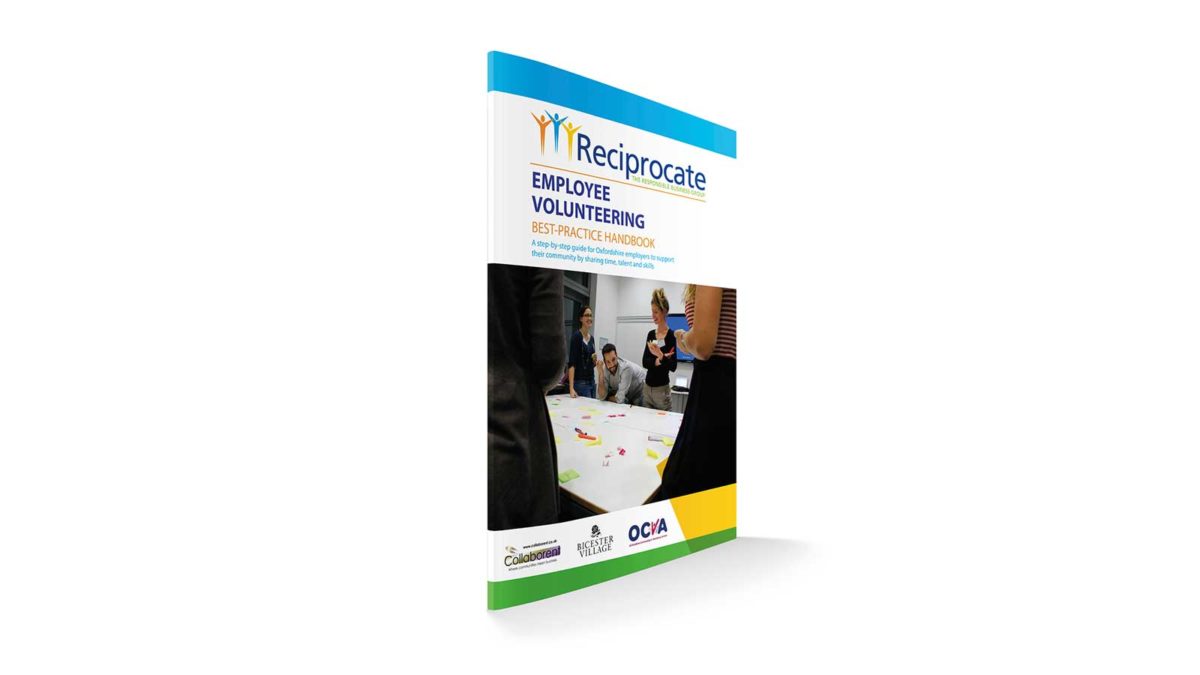
Building a more resilient, purposeful and attractive business
More businesses are recognising that embedding purpose into their businesses and having more positive social and environmental impact is essential for a successful and financially sustainable business. But why should you and how can you?
Why this is important – it’s not just a “nice to have”
I tend not to refer to CSR or Corporate Social Responsibility these days as it’s so often misunderstood and underestimated. It has also been regarded as something that can be added once a business is well-established, but we are truly witnessing a sea change in the ways businesses are operating. Companies leading the way are recognising not only the shared responsibility they have to help make the world a better place, but also the opportunities opened up by embracing this and embedding it into the heart of their businesses – whether start-ups or well-established, and here is why……
An employer of choice – attracting and retaining quality people: The increasingly competitive market for quality staff is demanding that potential employers become far more attractive. Equally, those already employed are seeking far more satisfaction and fulfilment from their work, as well as having more flexibility and feeling valued and engaged. This is particularly important to younger employees.
Winning more customers and satisfying the ones you have: All of us as customers are becoming far more discerning in terms of who we buy from. There is also a shift in thinking from the public, especially around the ways those we buy from treat the environment and generally operate their companies. Social Media means that bad news can go viral in an instant, as can great stories!
Investment: As well as seeking the best return on funds, investors are increasingly looking for ways their money can make more positive social and environmental impact. Therefore, there is an opportunity for positive attraction, but also the danger of deterring potential investors if you aren’t operating in many of the ways you can.
What can you do?
Develop a strategy: Clearly this all should start at the top, but it’s equally essential for genuine engagement from all levels within the business. Understanding how all areas of a business are or can be affected is vital, as well as the ways these areas can engage and benefit.
There are a number of models that can help with the overall approach. One, which is completely free, is offered by B Lab, supporting and promoting B Corporations and can be accessed here: https://bimpactassessment.net.
The B Impact Assessment is an online tool that helps you analyse and assess your current position, but also highlights ways in which you can improve your business. It is broken down into 5 main areas:
Workers: the ways in which you manage and care for your people.
Community: The way the company engages in and supports the local community.
Environment: The impact it has on the environment
Customers: The way the company trades up and down its supply chain, treats customers and suppliers and the products and services it provides.
Governance: The type of legal entity and the way the business is run, including involvement of employees in the decision-making process.
As a “B Leader”, having trained with B Lab to help companies consider becoming B Corporations, I work with this tool and find it extremely useful and enlightening as to what can be achieved. I therefore wholeheartedly recommend accessing it to benchmarking the way your company operates, but to also shine a light on the ideas and opportunities you have to build an even stronger and more positively impactful company. Other models and resources are also out there, including Blueprint For Better Business (https://www.blueprintforbusiness.org) and Purposely. (https://getpurpose.ly).
Practical, local, activities and engagement: There are so many things you can do to develop a more purposeful business and have more positive social and environmental impact, so it’s not possible to provide a comprehensive listing here. However, below are just some practical ideas and initiatives that can help you on your way.
Employees/workplace
Inclusive Employment: This is an increasingly topical subject and one which, as a former employer, I had no real understanding of back then. Since I moved from the corporate world to this area of operation I have learned so much about the opportunities this brings to employers. And it’s not simply about gender and ethnicity. Check out Aspire Oxford’s offering on Inclusive Recruitment: https://www.aspireoxfordshire.org/what-we-offer
Workplace Wellbeing: More employers are keen to improve the ways in which they can support their staff, although sometimes aren’t aware of precisely how they can go about doing so. The Oxfordshire Workplace Wellbeing Network was set up by employers, for employers and is a peer network that is free to join. You can join the LinkedIn Group here: https://www.linkedin.com/groups/8515963
Employee volunteering: Boosting morale and providing the opportunity for your people to get more involved in the local community is not only good for your business, but great for them and the local community too. There are some exciting initiatives developing, so watch this space, but in the meantime, you can download this handy guide: http://reciprocateox.org/wp-content/uploads/2018/04/Reciprocate-Volunteering-Handbook-2018-ONLINE.pdf
Community
Community engagement is a huge topic in itself and there are so many ways businesses can develop strong, mutually beneficial relationships with the local community. Companies often immediately think about supporting local charities, which is absolutely something I would endorse and encourage. However, there are many more opportunities including local schools and colleges as well as supporting local community initiatives, business networks, parish councils and other local committees. Check out these resources for more information:
OxLEP Skills team for connections with local schools
https://www.oxfordshirelep.com/skills
The ROBIN Network – sharing skills and resources across sectors: www.robinoxford.org.uk
Environment
A particularly topical subject currently and another area that has a myriad of elements you can follow to improve your business. Check out:
OxFutures – http://oxfutures.org
The UN Sustainable Development Goals –
https://sustainabledevelopment.un.org
Bioregional’s One Planet Living model –
https://www.bioregional.com/one-planet-living
Better Business (https://www.betterbusinesspack.com), developed by Seacourt Print.
Marketplace – Customers and suppliers
Asking more questions of your suppliers, the provenance of your products and services as well as being more transparent and responsive to customers can multiply your impact. Do you pay your suppliers promptly and treat them fairly? Buying from sources closer to you and from local, independent businesses can make a difference to the environment and local economy. Do you “Buy Social”? https://www.socialenterprise.org.uk/campaigns/buy-social-for-a-better-world
Governance
It’s appreciated that most readers will be with private limited companies including micro businesses and perhaps even sole traders. But this sub-topic is still relevant to you whatever type or size. The word Governance is being used here in the widest sense, It could be the legal entity, the way a company is structured, managed and run. More private companies, like B Corps are embedding commitments to positive social and environmental impact in their Articles of Association to demonstrate transparency and accountability for the ways in which they operate.
Some companies are even choosing to share the wealth of the business with employees and a great local example of this is The Rooflight Company: https://www.therooflightcompany.co.uk. But even mainstream, private limited companies can engage and involve staff more in strategic development, the decision-making processes and operational aspects of the company to evolve it to become a Business as a Force ror Good
In summary
Hopefully this has helped opened your mind to some new ideas about embedding this as “business as usual” and shown how they might also help solve or alleviate some of your day to day challenges and open up business development opportunities for you. It’s my belief that companies that don’t adopt these ways of working will soon fall behind. Customers won’t want to buy from them, people won’t want to work for them, and investors will be directing their funds elsewhere. I am even seeing suppliers becoming fussier.
But this needs to be undertaken authentically, engaging your people, listening to your clients and other stakeholders and peers.
More in Coaching
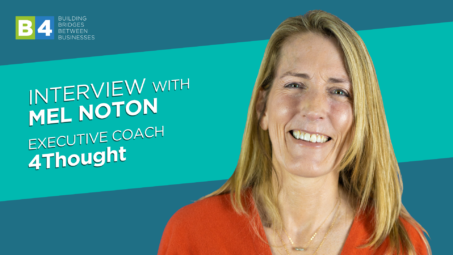
Interview with Mel Noton of 4Thought: Pushing Boundaries & Delving Deeper
Mel Noton is an Executive Coach who has a passion for extracting the full potential of her clients which include CEO’s, senior leaders, executives or leadership teams. Mel is a specialist in managing challenging, emotionally straining and draining work conflicts and situations to successful outcomes.
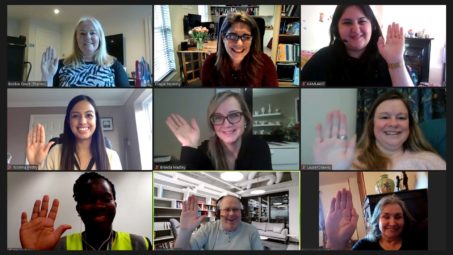
RoSPA and L’Oréal’s ‘Leading Safely’ programme gains huge momentum
RoSPA and L’Oréal’s Leading Safely for Women programme, part of their Safe@Work-Safe@Home partnership, which launched earlier this year has had a ‘phenomenal response’, according to Dr Karen McDonnell, RoSPA’s health and safety policy adviser.

Charge what you’re worth and get it
Join Alison Haill for the first episode of the Alison Haill podcast “Charge What You’re Worth And Get It”.
From this author
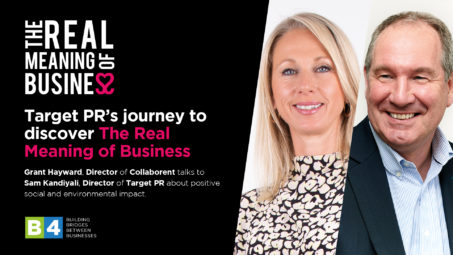
Target PR’s journey to discover The Real Meaning of Business
In this session Grant Hayward and Sam Kandiyali use the recently developed B4 TRMOB graphic as a tool to highlight the ways in which Target PR use the business for positive social and environmental impact.
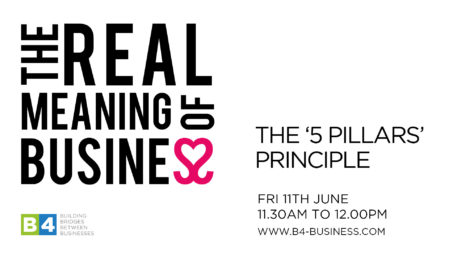
The ‘5 Pillars’ Principle | The Real Meaning of Business
On this episode of The Real Meaning of Business we illustrate the ‘5 pillars’ principle and how this framework can help members understand the context of what they might already be doing, as well as the opportunities and benefits of evolving and improving their business models.

Re-Energise Your ‘Mojo’
Back in November, B4 member Jackie Jarvis asked other members how they energised their ‘Mojo’. Now, as we hopefully approach, fingers crossed, the permanent end of lockdown, we revisit this article with Tim Wraith of Sobell House giving us an injection of his ways to keep going. Many of us will feel battered and bruised from the personal and professional challenges we have endured over the last 12 to 14 months, so how does Tim keep going? We also revisit what our members said last year in Jackie’s article.

